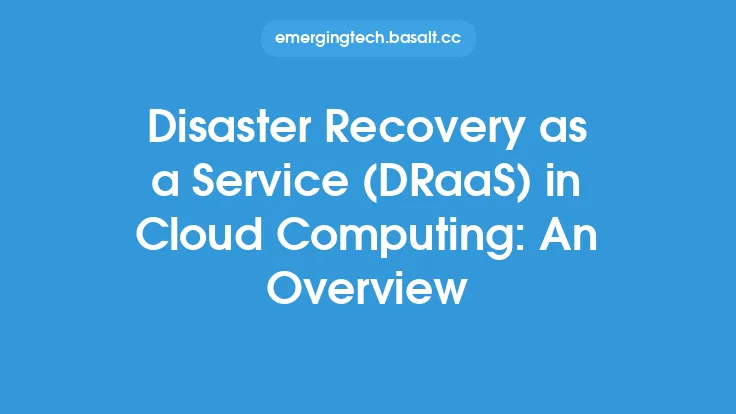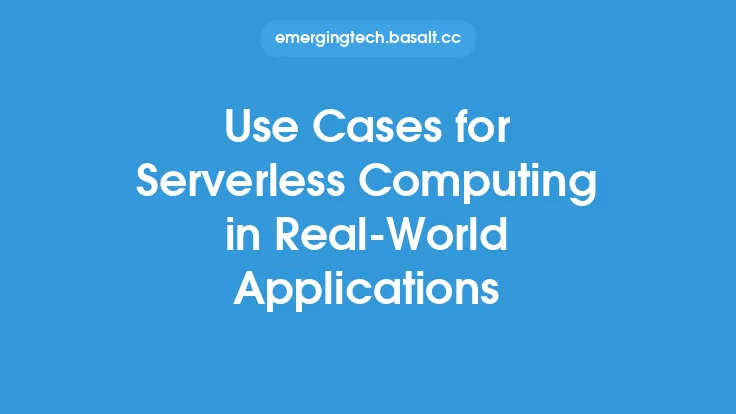Serverless computing has revolutionized the way applications are built, deployed, and managed in the cloud. At the heart of this revolution is Function-as-a-Service (FaaS), a cloud computing model that enables developers to write and deploy code without worrying about the underlying infrastructure. In this article, we will delve into the world of serverless computing and FaaS, exploring their key concepts, architecture, and technical details.
Introduction to Function-as-a-Service (FaaS)
Function-as-a-Service (FaaS) is a cloud computing model that allows developers to write and deploy small code snippets, known as functions, without provisioning or managing servers. These functions are executed on demand, and the cloud provider is responsible for scaling, patching, and maintaining the underlying infrastructure. FaaS provides a highly scalable and cost-effective way to build and deploy applications, as developers only pay for the compute resources consumed by their functions.
Architecture of FaaS
The architecture of FaaS is designed to provide a highly scalable and flexible way to deploy and manage functions. The core components of a FaaS architecture include:
- Functions: These are the small code snippets that are executed on demand. Functions can be written in a variety of programming languages, such as Node.js, Python, or Java.
- Event Sources: These are the triggers that invoke functions, such as API calls, changes to a database, or messages from a message queue.
- Function Runtime: This is the environment in which functions are executed. The function runtime provides the necessary resources, such as memory and compute power, for functions to run.
- Orchestration Layer: This layer is responsible for managing the lifecycle of functions, including provisioning, scaling, and terminating functions.
Technical Details of FaaS
FaaS provides a number of technical benefits, including:
- Scalability: FaaS platforms can scale functions up or down automatically, based on demand.
- Cost-Effectiveness: Developers only pay for the compute resources consumed by their functions, making FaaS a cost-effective way to build and deploy applications.
- Flexibility: FaaS platforms support a wide range of programming languages and frameworks, making it easy to integrate with existing applications and services.
- Security: FaaS platforms provide a secure environment for functions to run, including features such as encryption, access controls, and monitoring.
Comparison of FaaS Providers
There are a number of FaaS providers available, each with their own strengths and weaknesses. Some of the most popular FaaS providers include:
- AWS Lambda: AWS Lambda is a popular FaaS platform that provides a highly scalable and cost-effective way to build and deploy applications.
- Google Cloud Functions: Google Cloud Functions is a FaaS platform that provides a flexible and secure way to build and deploy applications.
- Azure Functions: Azure Functions is a FaaS platform that provides a highly scalable and cost-effective way to build and deploy applications.
- OpenWhisk: OpenWhisk is an open-source FaaS platform that provides a highly scalable and flexible way to build and deploy applications.
Use of FaaS in Serverless Computing
FaaS is a key component of serverless computing, providing a highly scalable and cost-effective way to build and deploy applications. Serverless computing is a cloud computing model that enables developers to build and deploy applications without provisioning or managing servers. FaaS provides the core functionality for serverless computing, allowing developers to write and deploy code without worrying about the underlying infrastructure.
Conclusion
In conclusion, Function-as-a-Service (FaaS) is a powerful cloud computing model that enables developers to write and deploy code without worrying about the underlying infrastructure. FaaS provides a highly scalable and cost-effective way to build and deploy applications, making it a key component of serverless computing. By understanding the technical details and architecture of FaaS, developers can build and deploy highly scalable and flexible applications that meet the needs of their users. As the cloud computing landscape continues to evolve, FaaS is likely to play an increasingly important role in the development and deployment of applications.





